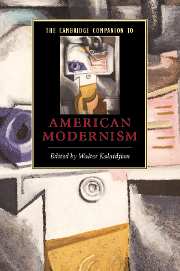Book contents
12 - Modern American literary criticism
from Part III - Society
Published online by Cambridge University Press: 28 May 2006
Summary
If by “modern American literary criticism ” we mean the evaluative and theoretical discourse most closely related to the high modernist literature of the United States, we would need, in this kind of survey, to focus mainly on statements by that literature's makers. Undoubtedly, the most illuminating criticism of modernism is to be found in polemics such as Pound's Imagist manifesto, Hughes's delineation of the racial mountain, and Stein's lectures in America, as well as the poetry, prose writing, and plays that - just as a longstanding commonplace holds - execute the most potent criticism of all in their formal ruptures, their surprising modes of being, their nervy materializations of the unexpected. The writers in question tried hard to outdistance assimilation by criticism as such, and for the most part they succeeded: although their experimentalism was noted at once, it was only around midcentury that modernism as we now think of it began to be written about as a coherent formation. And this recognition, as we will see, was inseparable from a sense that what had rendered modernism visible was nothing other than its recent death.
We might, however, construe “modern American literary criticism” in a different way: as the discourse produced in this period by writers who regarded themselves principally or significantly as critics. This discourse had much to say about the literature of its own moment, but it was at least as concerned with the Elizabethans as with the moderns, at least as apt to dwell on Dryden or Poe as to take up Frost or Cather. Moreover, this discourse failed to take most of the makers of literary modernism especially seriously as critics, however vigorous or groundbreaking their polemics. Why, then, should a reader interested primarily in American modernism bother with this body of writing?
- Type
- Chapter
- Information
- The Cambridge Companion to American Modernism , pp. 284 - 307Publisher: Cambridge University PressPrint publication year: 2005



